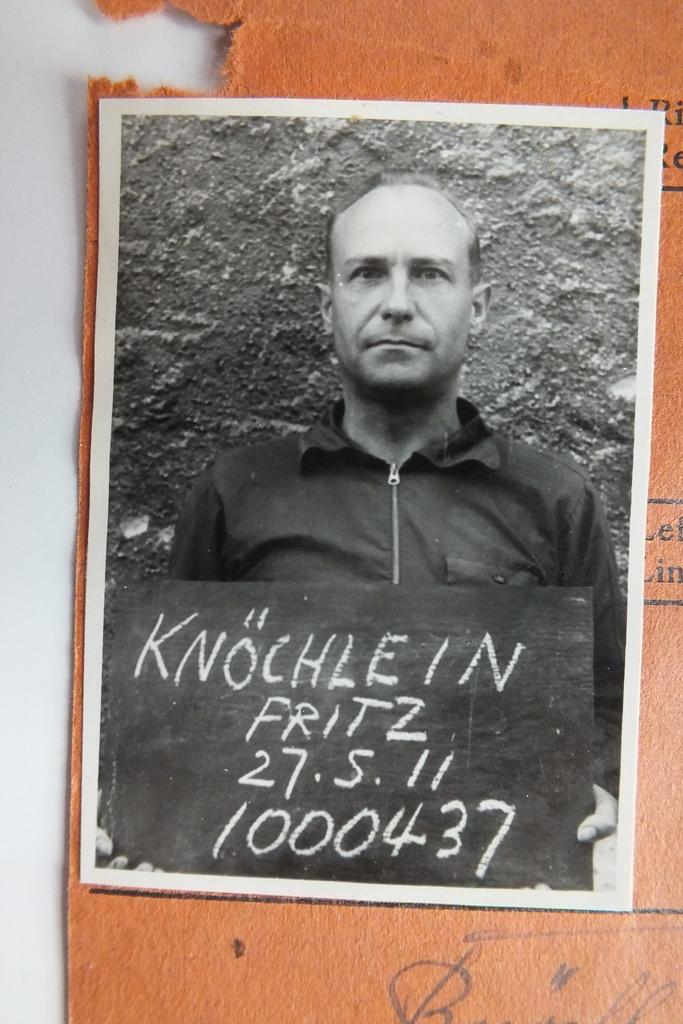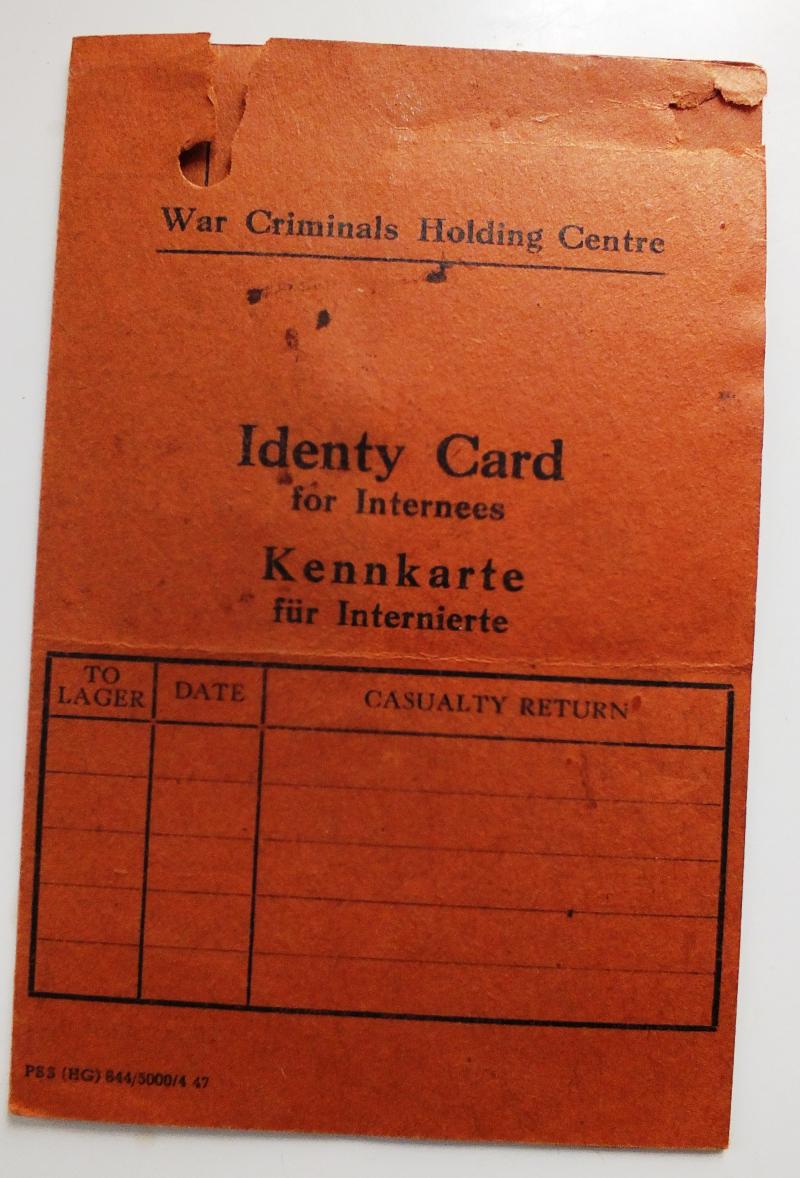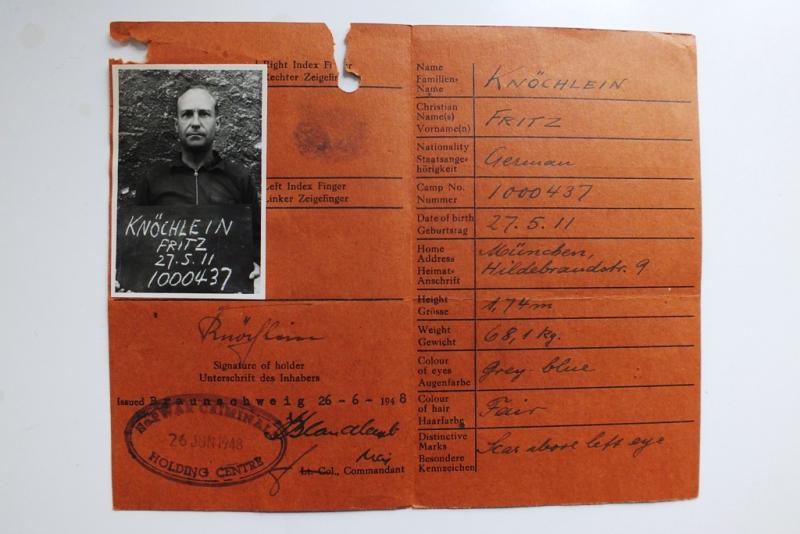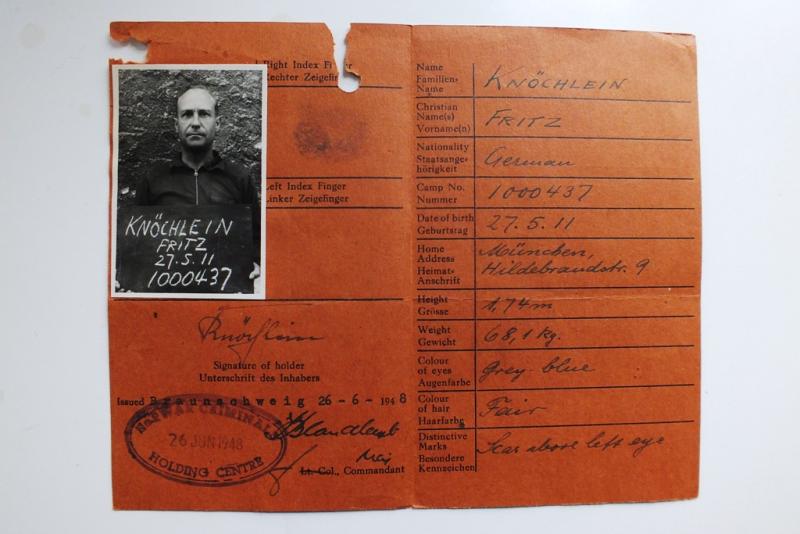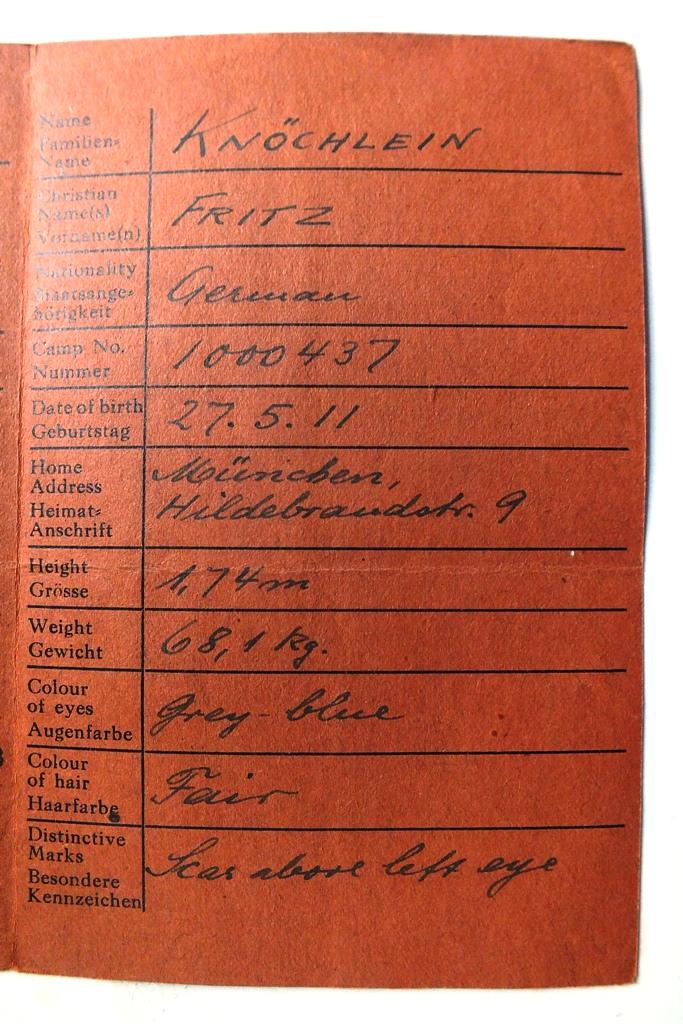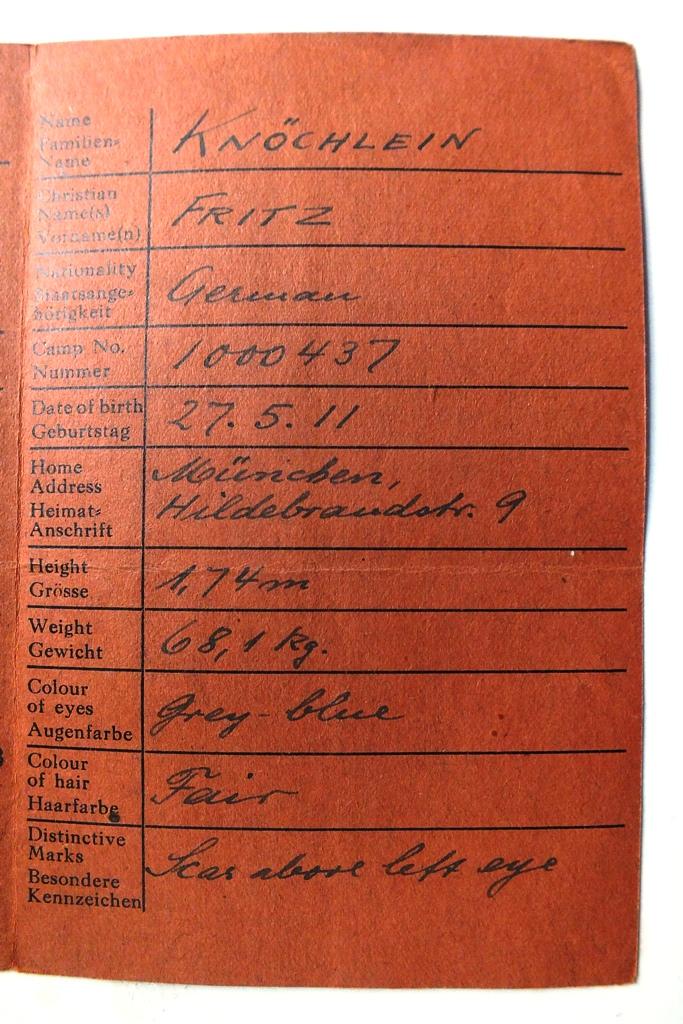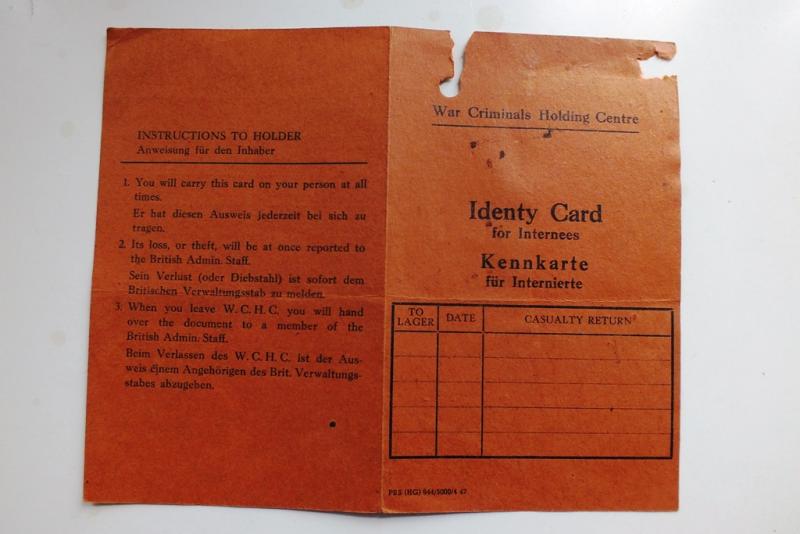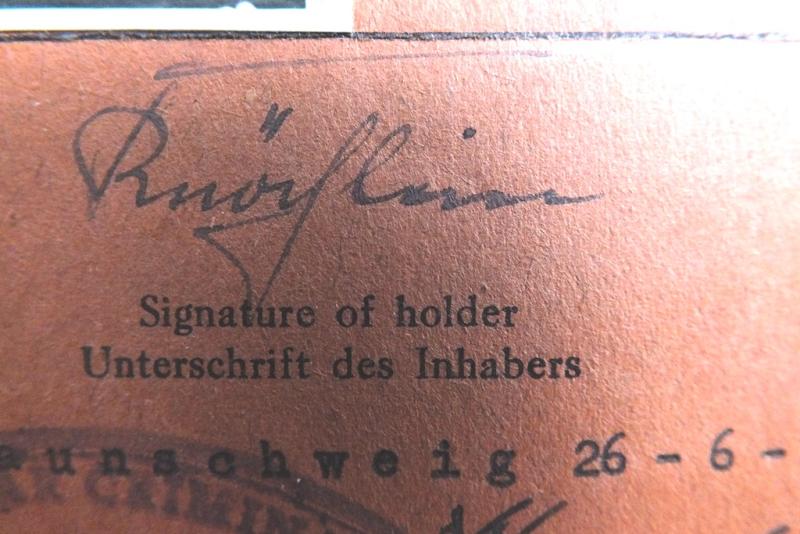RITTERKREUZETRAGER SS-STURBANNFUHRER FRITZ KNOCHLEIN DOCUMENT
ID card for the war criminals holding centre at Braunschweig. Includes a crisp clear photo of Knochlein holding his prisoner board with his personal details, also his finger print and his signature, extremely rare document.
Fritz Knoechlein was born in Munich on 27th May, 1911. He joined the SS in 1934 at the age of 23 and became a member of the 3rd SS Division (Totenkopf) at the SS training area close to Dachau. He was promoted to the rank of Haupsturmfuhrer (Captain) and fought during the Battle of France in May and June 1940.
Knoechlein was held responsible for the massacre of the 2nd Battalion Royal Norfolk Regiment and others at Le Paradis on May 27th, 1940. This is covered fully throughout this web site. Knoechlein ordered two machines guns to be turned on the troops and followed this up by ordering German soldiers to shoot and bayonet any apparent survivors. He also ordered the immediate burial of the dead along the barn wall.
After the French campaign, Knoechlein was appointed company commander of an anti aircraft artillery battery in the Totenkopf Division and he served in this capacity on the Russian Front until summer 1942, when he was appointed Sturmbannfuhrer (Major) in command of the 3rd Regiment Totenkopf Division. In October 1943, he became commander of No 36 Regiment of the newly formed 16th SS Panzer Grenadier Division and was promoted to Obersturmbannfuhrer (Lieutenant Colonel) and appointed commander of a Norwegian SS volunteer unit from March 1944 to January 1945.
Knoechlein was awarded the Iron Cross First and Second Class, the German Cross on Gold and the Knight's Cross of the Iron Cross, but will always be remembered as "The Butcher of Le Paradis."
After the war Bert Pooley, one of the two survivors of the massacre, continued to hunt for Knoechlein who was eventually found in a prisoner of war camp in Sheffield, England. Knoechlein had been picked up by the Americans and was transferred and interned in their camp in Yorkshire. He was subsequently found guilty of war crimes and sentenced to death following a trial in Hamburg, Germany. Knoechlein was hanged on January 28th, 1949, in Hamelin at the age of 37.
In 1957, Lt Colonel A. P. Scotland OBE had his book "The London Cage " published. It was in essence an autobiography of Lt Col. Scotland with some information about the London Cage - an interrogation unit situated in Kensington. Knoechlein was one of the prisoners who was "interviewed" in the Cage and who later made accusations that he was tortured whilst there. Scotland's book was subjected to heavy censorship and included the following notice:
"The War Office wishes to make it clear that the views and facts stated in this book are the Author's own responsibility. Further, the War Office does not in any way vouch for the accuracy of the facts and does not necessarily accept any opinion expressed in this book."
The book includes a complete chapter entitled "Mass Murder at Paradis" which starts with the following description of Knoechlein:
"When Fritz Knoechlein was first ushered into my room at the London Cage, our Kensington Palace Gardens interrogation HQ near Hyde Park, I studied his face for a full minute before speaking. Here was a Nazi of the first order, the worst order, a German who had dedicated himself to brutality; irresponsible in possession of power, ruthless in execution; a man who represented everything that Adolf Hitler desired in an officer serving the Third Reich."
The chapter continues:
"Nearly nine years elapsed before the guilty Knoechlein went to the gallows, but throughout those nine years his face was never expunged from the mind's eye of a certain wrinkled French peasant, Madame Romanie Castel, whose recognition of the SS criminal was to become an important factor in his conviction.
"On October 12, 1948, this old Frenchwoman stepped from the witness box and hobbled towards the centre of a Hamburg military courtroom. She turned slowly, peering at the faces around her, at the lawyers, interpreters, clerks, court officials and witnesses alike ... Then suddenly, she pointed the forefinger of a thin bony hand at Fritz Knoechlein crying, "That is him, that is the man!"
"It was the most telling moment, certainly the most tense, of a trial for which I and my officers of the War Crimes Investigation Unit had conducted a two years' probe, searching, questioning, finally moulding into legal shape the events of 1940, and the guilt of Fritz Knoechlein."
In the same chapter Scotland describes the German further with the following words:
"In his mid thirties, toughly-built, having a distinctly unpleasant face, his eyes and mouth full of inhumanity, he was like many of his Totenkopf officer comrades - a professional product of the concentration camps; in his case the training in brutality was gained at Dachau, where he had held the rank of company commander."
The hangman at Knoechlein's execution was Englishman Ted Roper, a colossus of a man weighing over 20 stone and standing well over 6ft tall. He had the following to say about Knoechlein:
"He was very pompous and unrepentant to the end and when asked his religion, snarled 'atheist'. Accordingly he was not given the usual attendance of a minister. As I led him to the scaffold after securing his arms, he stared hard at me and made a noise in his throat as if to spit. I was too quick however and bundled him unceremoniously on the trap door. He disappeared shouting "Gott Strafe" but was too late to get out the last word which was presumably 'England'."
It is our understanding that responsibility for the investigation of war crimes was handed back to Germany in the 1960s. It was following this that Knoechlein's wife made an unsuccessful attempt to have his conviction overturned.
NOTE - "Gott Strafe England" was a slogan initially used by the German Army during the First World War and literally means "May God punish England." It was created by the German poet Ernst Lissauer who also wrote a poem engagingly titled "Hate Song Against England" which was also known as "Hymn of Hate."
It is interesting to note that Knoechlein's last words were to call on God to punish England despite the fact that when interrogated he gave his religion as "atheist" - in other words a non belief in God!
Code: 6439

